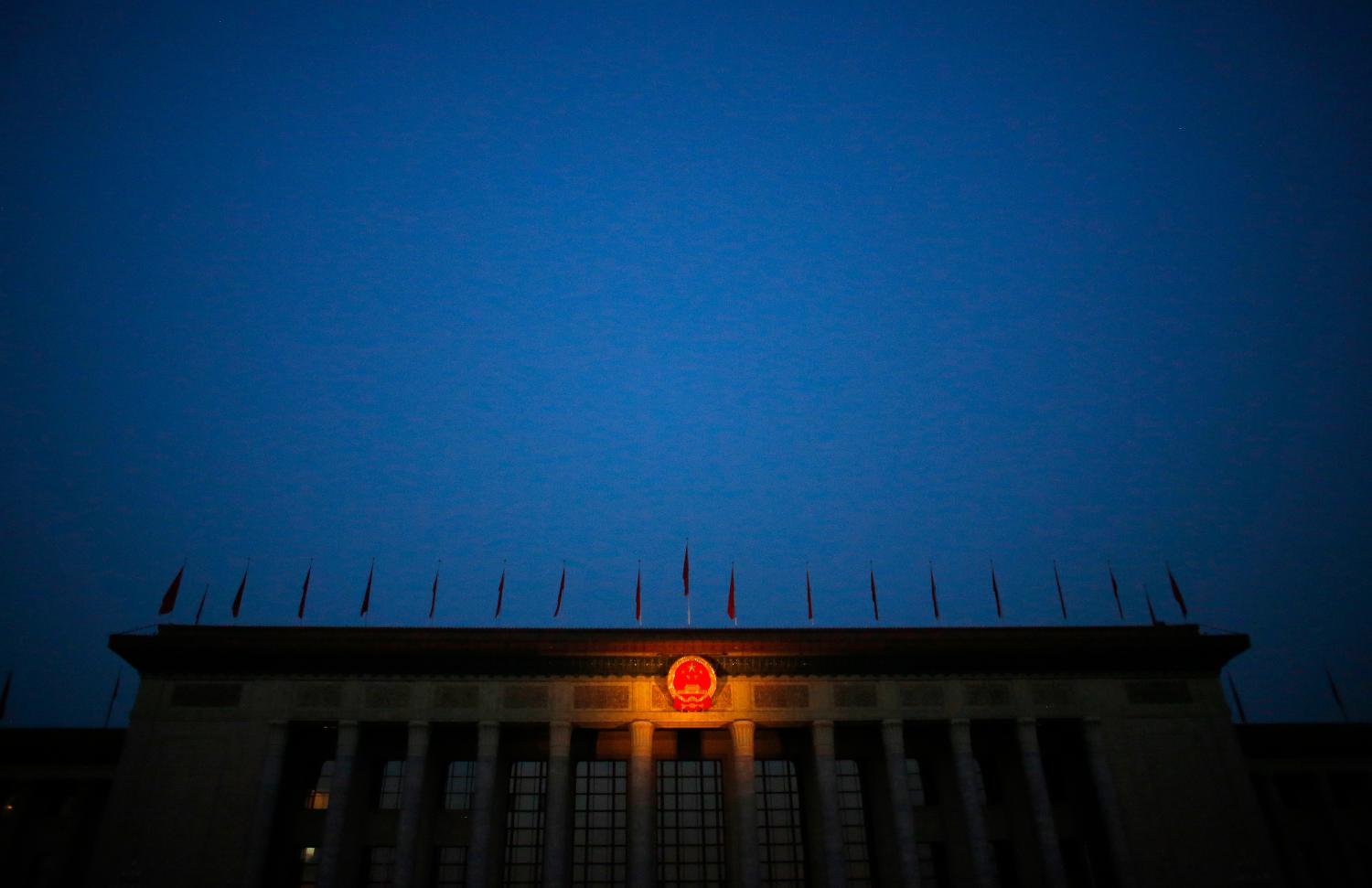 Saudi Arabia values its relations with China, but it is well aware of their limits. Beijing will not replace Washington in Riyadh’s worldview, even if U.S.-Saudi relations falter in the next administration.
Saudi Arabia values its relations with China, but it is well aware of their limits. Beijing will not replace Washington in Riyadh’s worldview, even if U.S.-Saudi relations falter in the next administration.
As with most issues concerning the Kingdom of Saudi Arabia, Riyadh’s relations with China are all about oil. China is Saudi Arabia’s top economic trading partner because China is the biggest importer of Saudi oil. There is little strategic cooperation between the two, however, and China does not share the Saudis’ hostility to Iran. Saudi Arabia’s strategic partner remains the United States, and almost all of its arms supply comes from the United States, the United Kingdom, and other Western states. China has enthusiastically embraced the controversial crown prince, Mohammed bin Salman, suggesting the relationship will not be endangered because of his reckless decisionmaking.
Arms sales beginning in the 1980s
Saudi Arabia was a strong opponent of communism in the Cold War and did not have any diplomatic relations with China until the late 1980s. It was a firm supporter of the nationalist government in Taiwan. The impulse to open relations flowed from a clandestine arms deal between the two. In the mid-1980s, Saudi Arabia felt threatened from two sources: Iran and Israel. The Iran-Iraq war had begun in September 1980 with an Iraqi invasion of Iran. Saudi Arabia was Iraq’s ally and financier. President Saddam Hussein had previewed the war in a meeting with King Fahd in Taif in August. The tide of war rapidly shifted against Iraq, and Iran threatened to invade Iraq multiple times in the 1980s. Israel demonstrated the long reach of its military capabilities by bombing Iraq’s Tuwaitha nuclear plant in 1981, and then the headquarters of the Palestine Liberation Organization in Tunis in 1985. The Saudis were eager to acquire medium-range ballistic missiles to deter both Iran and Israel, but their traditional arms suppliers in the West would not sell them.
Fahd and his defense minister, Prince Sultan bin Abdulaziz Al Saud, decided to reach out to China. Sultan turned to two of his sons — Saudi ambassador to the United States, Prince Bandar bin Sultan Al Saud, and his brother who commanded Saudi Arabia’s air defense, Prince Khalid bin Sultan Al Saud — to open a dialogue with Beijing and then bring and install missiles to the kingdom covertly. Bandar privately approached his Chinese counterpart in Washington, Han Xu, and asked if Beijing would provide missiles. The answer back was positive, so borrowing from former Secretary of State Henry Kissinger’s playbook, Bandar traveled to Pakistan where he met secretly with Chinese officials. In July 1985, Bandar made the first of three secret visits to Beijing to work out the details
The Chinese then sent a secret team to Riyadh to meet with Prince Khalid to engage military-to-military. The deal was finalized in December 1986: Approximately 50 Chinese CSS-2 missiles, code-named East Wind; they would be shipped to Saudi Arabia and installed in hidden in ground installations; and the Chinese would train Saudi crews to operate them. Khalid made four trips to China to finalize all the details and oversee the transfer. Khalid later wrote that the missiles gave “us the capability to counterattack in event of an attack on us by either Israel or Iran.”1 Others characterized the sale as acquiring an already-outdated system with little utility, since it had a conventional warhead rather than a weapon of mass destruction.
The Central Intelligence Agency detected the missile base in Saudi Arabia in early 1988, prompting an immediate crisis between Washington and Riyadh. President Ronald Reagan wanted the missiles removed immediately, but Fahd refused. The story leaked into the Washington Post on March 18, 1988.2 The Saudis worried Israel would attack the installation. Bandar asked Colin Powell, Reagan’s national security advisor, to assure the Israelis that the missiles were only for defensive use. Powell later recalled that the situation was very tense. Had Israel attacked the missile base, Chinese technicians would have been killed, along with Saudis. But Israel demurred under intense pressure from Reagan.
To underscore their anger with Washington’s criticism of the missile purchase, Fahd had U.S. Ambassador Hume Horan expelled from the kingdom. The missiles remain operational in Saudi Arabia to this day. The Saudis only displayed them once to the public: in 2014, during a parade to honor the visiting Pakistani army chief of staff. They have never been used in combat, either with Iraq in 1991 or today in the war in Yemen.
The missile deal led to the opening of Saudi diplomatic relations with China after another Bandar trip to Beijing in July 1990. But it did not lead to additional large sales of military equipment. Reports of an additional sale of more sophisticated missiles, CSS-5s, have never been confirmed. The Saudis have purchased drones from China, which they use in Yemen. Saudi Arabia continues to rely on American and British aircraft for its air force, American tanks for its army, and Canadian infantry fighting vehicles for its National Guard. The deal was also puzzling in that China equips the CSS-2 with nuclear warheads. Why do the Saudis only have conventional warheads? Rumors of a secret Pakistani commitment to provide nuclear warheads have swirled for years, also without confirmation.
Today, a focus on trade and energy
China has not joined in Saudi Arabia’s conflicts with Iran, its regional rival. Saudi Arabia and Iran back hostile proxy forces from Lebanon to Yemen, and China remains a supporter of the Joint Comprehensive Plan of Action (JCPOA), or the Iran nuclear deal. There is no indication that the Saudis have sought to press China to violate the JCPOA, as the United States has done.
As trade grew, so did Saudi interest in developing high-level dialogue with Beijing.
Once relations were opened, China rapidly became a major consumer of Saudi oil exports, and Saudi Arabia consistently provides China with more energy than any other country. As trade grew, so did Saudi interest in developing high-level dialogue with Beijing. As a reflection of the importance of China for Saudi Arabia, it was a stop on the first trip abroad that King Abdullah made after ascending to the throne in 2005. Riyadh was looking east, not west, was the message. Abdullah signed several major agreements on energy cooperation during his January 2006 visit. President Hu Jintao made a reciprocal visit to Riyadh in April 2006.
In March 2017, King Salman visited China as part of a large Asian trip that also took him to Malaysia, Indonesia, Brunei, and Japan. China was the final destination. Again, the emphasis was on trade and energy.
The most important recent exchange between Saudi Arabia and China was in February 2019, when the Crown Prince Mohammed bin Salman visited as part of an Asian tour. It was the crown prince’s first big foreign trip since the murder of the Saudi journalist Jamal Khashoggi at the Saudi consulate in Istanbul, Turkey in October 2018. The crown prince dispatched the team of assassins who killed Khashoggi and then hid his remains. The crown prince has been ostracized by much of the world for his involvement in the death of the Washington Post columnist, although the Trump administration has stood by him.
After stops in Pakistan and India, Mohammed bin Salman arrived in China, where the Khashoggi affair was never raised. Both sides characterized the relationship as trouble-free. An agreement was signed to build a refining and petrochemical complex in Liaoning province as a joint Saudi-Chinese venture, as were numerous other deals.
Most importantly, the crown prince stressed publicly that “China has the right to take anti-terrorism and de-extremism measures to safeguard national security.”3 This was a clear endorsement of the Chinese repression of its Uighur Muslim minority in Xinjiang province. Muslim-rights groups sharply criticized the crown prince for failing to defend the rights of an endangered Muslim community. Many critics of the Saudis considered it inconsistent with the monarchy’s frequent claim to be the defender of Muslim rights, as well as the Custodian of the Two Holy Mosques.
New pressures: The pandemic and U.S. politics
The COVID-19 pandemic has hurt the kingdom very seriously. The pilgrimage of Muslims to Mecca and Medina has been suspended indefinitely. As oil demand has plummeted, so too have oil prices, and the Saudi economy is in depression. Saudi Arabia has turned to China to purchase 9 million test kits to fight the virus, and 500 Chinese medical experts have come to the kingdom to run six laboratories. The royal family has been hit badly by the virus. The governor of Riyadh province, the job King Salman held for a half-century, was reported to have been hospitalized after testing positive for the disease. Until global demand for oil returns to pre-virus levels, Saudi finances will have to draw down on the kingdom’s reserves. Trade with China will go down.
If former Vice President Joe Biden wins the November election, a Democrat-run foreign policy is likely to bring some profound changes in U.S. policy with the kingdom. Biden has called Saudi Arabia a “pariah” that should be “punished” for the murder of Jamal Khashoggi.4 He has joined with other key Democrats in calling for a halt to arms sales as long as the Yemen war continues (despite the fact that the war began on his watch, under President Barack Obama). A downgraded relationship, especially with the crown prince, is all but certain. The Chinese may try to take advantage of the downturn, but given the significant limits discussed above on their influence, any improvement in Saudi-China relations is likely to be more symbolic than substantial.
-
Footnotes
- Bruce Riedel, Kings and Presidents: Saudi Arabia and the United States since FDR (Washington, DC: Brookings Institution Press, 2017), 94.
- John M. Goshko and Don Oberdorfer, “Chinese sell Saudis missiles capable of covering Mideast,” The Washington Post, March 18, 1988, https://www.washingtonpost.com/archive/politics/1988/03/18/chinese-sell-saudis-missiles-capable-of-covering-mideast/c9dfdf67-3697-42a8-9164-e0239a0b3154/.
- “Saudi crown prince defends China’s right to fight ‘terrorism,’” Al Jazeera, February 23, 2019, https://www.aljazeera.com/news/2019/02/saudi-crown-prince-defends-china-fight-terrorism-190223104647149.html.
- Travis Waldron, “Joe Biden Says He’d End Aid To Saudis, In Contrast To Obama,” Huffington Post, November 20, 2019, https://www.huffpost.com/entry/biden-saudi-arabia-democratic-debate_n_5dd6032be4b0fc53f20db9c3.
The Brookings Institution is committed to quality, independence, and impact.
We are supported by a diverse array of funders. In line with our values and policies, each Brookings publication represents the sole views of its author(s).







Commentary
Saudi Arabia’s relations with China: Functional, but not strategic
July 20, 2020